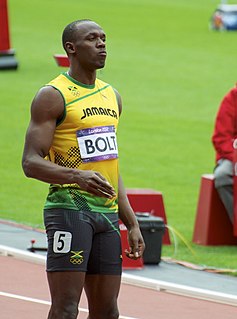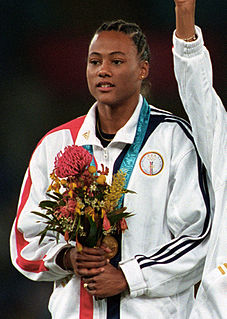| United States at the World Championships in Athletics | |
|---|---|
 | |
| IAAF code | USA |
| National federation | USA Track & Field |
| Website | www |
| Medals Ranked 1st |
|
| World Championships in Athletics appearances (overview) | |
The United States has competed at every edition of the World Athletics Championships since its inception in 1983. It has been the most successful nation at the global competition for track and field. By the end of the 2017 World Championships, its athletes had won a total of 352 medals, 155 of them gold – more than double that of the most successful nation Kenya, as well as more than the combined total of the Soviet Union and post-Soviet states. It has been the top nation in the championships medal table at every edition bar 1983 and 1987 (East Germany), 2001 (Russia) and 2015 (Kenya). It also ranks number one on points in the national placing tables. As one of the foremost nations in the sport internationally, its delegations for the championships are among the largest.

The United States of America (USA), commonly known as the United States or America, is a country comprising 50 states, a federal district, five major self-governing territories, and various possessions. At 3.8 million sq mi (9.8 million km2), the United States is the world's third or fourth largest country by total area and is slightly smaller than the entire continent of Europe's 3.93 million sq mi (10.2 million km2). With a population of more than 327 million people, the U.S. is the third most populous country. Most of the country is located contiguously in North America between Canada and Mexico. The extremely diverse geography, climate, and wildlife of the United States make it one of the world's 17 megadiverse countries.

Track and field is a sport which includes athletic contests established on the skills of running, jumping, and throwing. The name is derived from where the sport takes place, a running track and a grass field for the throwing and some of the jumping events. Track and field is categorized under the umbrella sport of athletics, which also includes road running, cross country running, and race walking.

Kenya has competed at every edition of the IAAF World Championships in Athletics since its inception in 1983. It has won the second highest number of gold medals at the tournament and has the third highest medals total.
Contents
The most decorated athlete of the competition's history is American: Allyson Felix has won sixteen World Championships medals, eleven of them gold, competing across the individual and relay sprint events. Among men, the United States has three of the four most decorated men (after Usain Bolt), all of them sprinters; LaShawn Merritt has eleven medals, Carl Lewis won ten and Michael Johnson won eight. All three won eight gold medals. Johnson is the nation's most successful athlete individually (and the third most successful overall), having won six gold medals in the 200-meter dash and 400-meter dash. American Gail Devers is the second most successful woman individually, with four golds and two silver medals from the 100-meter dash and 100-meter hurdles. Felix and Amy Acuff have made the most appearances for the United States, each having represented their country at eight separate editions.

Allyson Michelle Felix is an American track and field sprinter who competes in the 100 meters, 200 meters, and 400 meters. At 200 meters, she is the 2012 Olympic champion, a 3-time World champion (2005–09), and 2-time Olympic silver medalist (2004–08). At 400 meters, she is the 2015 World champion, 2011 World silver medalist, 2016 Olympic silver medalist, and 2017 World bronze medalist.

Sprinting is running over a short distance in a limited period of time. It is used in many sports that incorporate running, typically as a way of quickly reaching a target or goal, or avoiding or catching an opponent. Human physiology dictates that a runner's near-top speed cannot be maintained for more than 30–35 seconds due to the depletion of phosphocreatine stores in muscles, and perhaps secondarily to excessive metabolic acidosis as a result of anaerobic glycolysis.

Usain St Leo Bolt is a Jamaican retired sprinter. He is a world record holder in the 100 metres, 200 metres and 4 × 100 metres relay. Owing to his achievements and dominance in sprint competition, he is widely considered to be the greatest sprinter of all time.
The United States team was severely affected by doping during the period from 1997 to 2003, principally in sprinting events. Jerome Young, Marion Jones and Kelli White were all stripped of individual world titles during this time and the infractions of Antonio Pettigrew, Calvin Harrison and Tim Montgomery also resulted in a loss of relay gold medals for the United States teams. The first American to be stripped of a medal at the World Championships was shot putter Mike Stulce, who was stripped of the bronze medal for doping in 1993. As of 2017, a total of thirteen American athletes have had their results annulled at this competition due to doping.
Jerome Young in Clarendon, Jamaica, is a former sprint athlete. He was caught doping in 1999, and was ultimately banned from the sport, which cast suspicious shadows over his entire track & field career.

Marion Lois Jones, also known as Marion Jones-Thompson, is an American former world champion track and field athlete and a former professional basketball player for Tulsa Shock in the WNBA. She won three gold medals and two bronze medals at the 2000 Summer Olympics in Sydney, Australia, but was later stripped of her medals after admitting to steroid use. Jones did retain her 3 titles as world champions from 1997–1999.
Kelli White is an American former sprinter. She won two gold medals in the World Championships in Paris in 2003. However, on June 18, 2004, she was stripped of her medals, because she tested positive on a drug test. She retired from professional track in 2006.
















